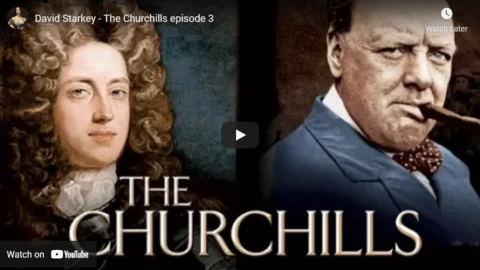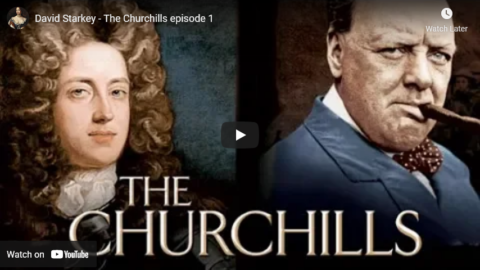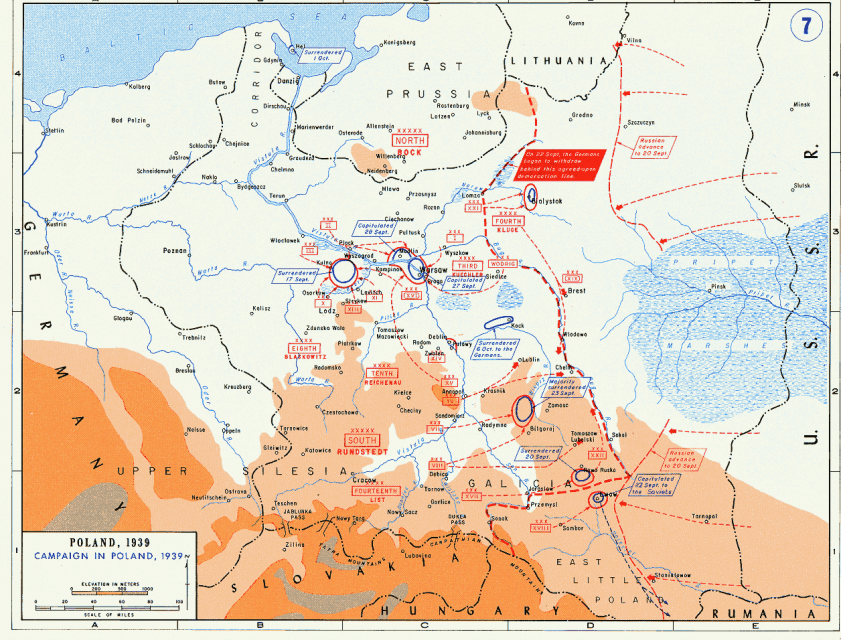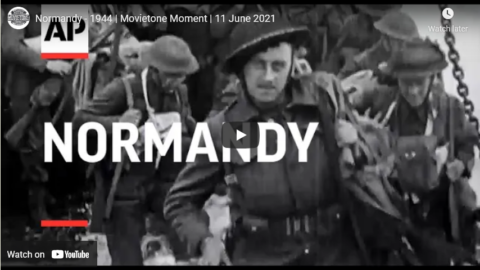It was more profound than that. France was now too small as well, and that is the reason why de Gaulle’s story is in the end a tragedy. Postwar America simply could not permit France to continue as she had. Washington would not risk another 1939. The former powers of Europe had to be cut down to size and compelled to get on with one another.
De Gaulle’s struggles with Churchill were, by comparison, lovers’ tiffs. Churchill, like most civilized Englishmen, loved France, “that sweet enemy”, as Philip Sidney called her. While de Gaulle was cold to veterans of the Resistance, Churchill — when he went to Paris to meet them — was so moved by their bravery that he was in tears for most of the day.
De Gaulle’s quarrel with Roosevelt was based on real loathing. Washington’s vision for postwar Europe, in which the old nations would be diminished and homogenized, was directly opposed to de Gaulle’s idea of a French resurrection in glory and might. Washington loved and promoted the idea of a Europe dominated by supranational bodies, and would later use Marshall aid and the CIA to spread the idea of a European union. Jean Monnet, one of the founders of the eventual European superstate, was much more welcome in the U.S.A. than de Gaulle, whom FDR once airily dismissed as “the head of some French committee.” No doubt, this was what Roosevelt wished he was. Nancy Mitford, in her satirical 1951 novel, The Blessing, neatly caricatured this American unifying vision of the new Europe in the figure of the appalling American world-reforming bore, Hector Dexter, who dreamed of seeing a bottle of Coca-Cola on every European table:
When I say a bottle of Coca-Cola I mean it metaphorically speaking, I mean it as an outward and visible sign of something inward and spiritual. I mean it as if each Coca-Cola bottle contained a djinn, and as if that djinn was our great American civilization ready to spring out of each bottle and cover the whole global universe with its great wide wings.
In May 1962, de Gaulle would oppose to this his assertion that Europe could not be real “without France and her Frenchmen, Germany and her Germans, Italy and her Italians.” He said (a recording of the performance still exists) that Dante, Goethe, and Chateaubriand “belong to Europe,” precisely because they spoke and wrote as Italians, Germans, or Frenchmen. They would not, he jeered, have served Europe much if they had been stateless and had written in some form of Esperanto or Volapük.
Peter Hitchens, “A Certain Idea of France”, First Things, 2019-04.
May 12, 2022
QotD: De Gaulle and FDR
January 24, 2022
David Starkey – The Churchills episode 3
Whitehall Moll History Clips
Published 29 May 2019How did Winston Churchill draw on the lessons of his ancestor John Churchill to fight World War II? The Duke of Marlborough’s influence is apparent as Dr David Starkey explains
January 23, 2022
QotD: The British governments of the 1930s
It follows that British democracy is less of a fraud than it sometimes appears. A foreign observer sees only the huge inequality of wealth, the unfair electoral system, the governing-class control over the Press, the radio and education, and concludes that democracy is simply a polite name for dictatorship. But this ignores the considerable agreement that does unfortunately exist between the leaders and the led. However much one may hate to admit it, it is almost certain that between 1931 and 1940 the National Government represented the will of the mass of the people. It tolerated slums, unemployment and a cowardly foreign policy. Yes, but so did public opinion. It was a stagnant period, and its natural leaders were mediocrities.
In spite of the campaigns of a few thousand left-wingers, it is fairly certain that the bulk of the English people were behind Chamberlain’s foreign policy. More, it is fairly certain that the same struggle was going on in Chamberlain’s mind as in the minds of ordinary people. His opponents professed to see in him a dark and wily schemer, plotting to sell England to Hitler, but it is far likelier that he was merely a stupid old man doing his best according to his very dim lights. It is difficult otherwise to explain the contradictions of his policy, his failure to grasp any of the courses that were open to him. Like the mass of the people, he did not want to pay the price either of peace or of war. And public opinion was behind him all the while, in policies that were completely incompatible with one another. It was behind him when he went to Munich, when he tried to come to an understanding with Russia, when he gave the guarantee to Poland, when he honoured it, and when he prosecuted the war half-heartedly. Only when the results of his policy became apparent did it turn against him; which is to say that it turned against its own lethargy of the past seven years. Thereupon the people picked a leader nearer to their mood, Churchill, who was at any rate able to grasp that wars are not won without fighting. Later, perhaps, they will pick another leader who can grasp that only Socialist nations can fight effectively.
George Orwell, “The Lion And The Unicorn: Socialism and the English Genius”, 1941-02-19.
January 20, 2022
David Starkey — The Churchills episode 2
Whitehall Moll History Clips
Published 11 Feb 2019Dr David Starkey reveals how Winston Churchill’s biography of his ancestor John Churchill marked out Winston as the only politician who truly understood war — just as WWII loomed.
January 19, 2022
Neville Chamberlain, the “great appeaser”
Alexander Larman considers an attempt to paint British Prime Minister Neville Chamberlain in a much more positive light than his popular image after appeasement failed:
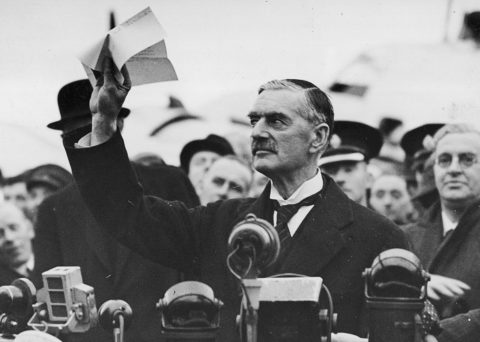
Prime Minister Neville Chamberlain at Heston Aerodrome, holding up a copy of the Anglo-German Declaration he had negotiated with Adolf Hitler, 30 September, 1938.
Narodowe Archiwum Cyfrowe via Wikimedia Commons.
On 30 September 1938, the Prime Minister Neville Chamberlain waved a piece of paper in his hand and declared “My good friends, for the second time in our history, a British Prime Minister has returned from Germany bringing peace with honour. I believe it is peace for our time.” He was, of course, incorrect. Less than a year later, Britain was at war with Germany, and the piece of paper was rendered meaningless.
Posterity has been hard on Chamberlain, regarding him as one of the least effective British premiers, and he has been entirely overshadowed by his more charismatic and successful replacement, Winston Churchill. Yet the bestselling author Robert Harris took a more sympathetic view of Chamberlain, and suggested in his 2017 novel Munich that, far from the Prime Minister being a hapless blunderer, he was in fact a canny tactician who bought his country an invaluable extra year to prepare for the coming conflict. This novel has now been filmed by Netflix, and has attracted particular attention for Jeremy Irons’ sympathetic and warm portrayal of Chamberlain.
Harris has even suggested that “I could perhaps show him as a tragic hero rather than merely the gullible old fool of popular myth … it is a mark of maturity to be able to hold two competing views in one’s head at the same time: that Churchill was vital to the defeat of Germany, and so, in a different way, was Neville Chamberlain.” Does he have a point, or is this just the canny spin of a novelist who has found a new and profitable angle to bring a well-worn story to life?
For my forthcoming book The Windsors at War, dealing with the royals in WWII and their relationships with the politicians of the day, I researched many letters and documents written by Chamberlain, members of the Royal Family and those around him in Downing Street. Several things came to light. There was residual antipathy between Chamberlain, who was an instinctive appeaser, and Churchill, who was not, and the Prime Minister privately derided the other politician as “a bandit” and “a pirate”. He also despised Attlee’s Labour party, calling them experts in “sob-stuff” sentimentality. He can undeniably be accused of high-handedness and complacency. Yet the charge of incompetence is a more deadly one.
Chamberlain himself came from a distinguished political family. His father Joseph was a ruthless Liberal parliamentarian who was said to have originated the phrase “you cannot teach old dogs new tricks”, and his elder brother Austen, one-time Chancellor of the Exchequer and leader of the Conservative Party, demonstrated a confidence in his intellectual abilities that his sibling did his best to emulate. He was not universally popular with his own side – the Conservative MP and diarist Harold Nicolson called him “a bourgeois shit” – but he generally had the support of his party in pursuing his policy of appeasement towards Hitler and Germany, believing – correctly – that Britain could not win the conflict outright.
January 18, 2022
David Starkey – The Churchills episode 1
Whitehall Moll History Clips
Published 7 Jan 2019David Starkey weaves the stories of two great British war leaders: John and Winston Churchill. Hear how John Churchill rose from obscurity to be King James II’s right-hand man.
December 24, 2021
How Hitler, Churchill, Roosevelt, and Stalin Spent Christmas – WW2 Special
World War Two
Published 23 Dec 2021They might be four of the most powerful politicians and/or military leaders on earth, but they are also citizens of their respective countries and today we take a look at what they do over the traditional Christmas holidays in 1942.
(more…)
November 19, 2021
The Allied 1942 Plan to Invade Europe – WW2 Special
World War Two
Published 18 Nov 2021The second front has been opened, and Allied forces are invading Vichy French Northwest Africa. But did you know that it could very well have been an invasion of Europe taking place right now instead? Let’s examine how this idea came about, and why it never worked out.
(more…)
November 5, 2021
A United Front Against Nazi Atrocities – WAH 045 – October 1942, Pt. 2
World War Two
Published 4 Nov 2021As the war intensifies on all fronts, the occupied world is aflame with resistance and reprisals. From Paris to Papua New Guinea, Humanity is under attack — but it is also fighting back.
(more…)
October 30, 2021
Revisiting the Battle of Britain
In The Critic, Phillips O’Brien has a historical hot take on the popular view of the Battle of Britain:
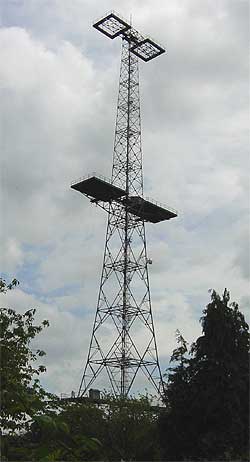
The Chain Home Tower in Great Baddow Chelmsford, a key part of Britain’s air defence network.
Photo by Stuart166axe via Wikimedia Commons.
The Battle of Britain was a lopsided affair. One side was much stronger and more modern, with advanced integrated detection technologies, superior logistics and intelligence, excellent fighter control, and much better production facilities churning out far more of the most important equipment.
The other side was plucky, flying from considerably less developed facilities, operating under severe handicaps in intelligence and flying time over the battle area, lacking the proper technology to achieve anything like what it wanted, and with a severely underutilized industrial base.
The stronger side was Great Britain and the plucky underdogs were the Germans.
The Battle of Britain was always one that the Germans were bound to lose quickly and disastrously. The key phase only lasted a few weeks during which German losses became unsustainably high and the Luftwaffe had to resort to the completely ineffective, if dramatic seeming, night time bombing of London and other British cities.
When the Battle of Britain entered this Blitz stage in early September, it was an admission by the Germans that they could not fly in the day over the UK and survive, and therefore they had no chance of actually damaging anything meaningfully in the UK.
Unfortunately this realistic vision of the Battle of Britain makes for both bad movies and bad politics, and for that reason a different vision has come down to us — that of plucky little Britain, relying on “the few” to defend itself against the mass power of the Luftwaffe and Nazi Germany.
This myth — partly witting, partly not — started to be created even before the Battle of Britain actually reached its climax, and it became such a useful one that it has persisted to today. Winston Churchill’s famous speech that “never has so much been owed by so many to so few” was given on August 20, 1940, though the Battle of Britain did not reach its highpoint until the two weeks between August 24 and September 6.
In that sense Churchill’s stirring phrase was a prophecy not a proper analysis — and it was a prophecy based on a fundamental misunderstanding of how strong the Luftwaffe and Germany were at the time. Churchill thought the Luftwaffe was twice as strong as it really was and that Germany was producing twice as many aircraft as it actually was. He believed that Britain had to rely on the few. It just wasn’t true.
Britain won the Battle of Britain because it was more powerful than Nazi Germany in the key areas the battle tested and because Britain was not standing alone, but fighting with a world-wide network of assets that meant it was never going to lose.
The Germans had one advantage going into the battle — the number of aircraft on hand (though the numbers of deployable German fighters was only a little higher than that of the RAF). However even this numerical advantage was partly irrelevant as German bombers, small, slow two-engine machines such as the HE-111 and DO-17, were inadequate to the task and the famous Stuka dive-bombers, even slower and more primitive, were more dangerous for their crews to fly than they ever were to the British being bombed by them.
In response the RAF had radar, which could see the Germans coming and give the RAF time to prepare, could fly for far longer over the Battle areas from its bases in southern England than the Germans could fly from their bases in France, and could rescue the majority of its pilots show down while the Germans lost theirs that survived to British prisoner of war camps.
October 4, 2021
QotD: Theresa May is to Boris as Neville Chamberlain was to Winston
Whisper it gently, but there’s a mysterious woman in Boris Johnson’s life. Someone very special to him. Though she gets none of the credit, she’s the secret of his success, so it’s time she emerged from the shadows and received the recognition she deserves. Step forward … Theresa May.
Exactly two years ago, our second female Prime Minister was bowing out. After a torrid time in office it was finally over, and it ended with characteristic grace. In her resignation statement, she blamed no one for her fall, expressing only gratitude for the chance she’d had to serve the country she loved.
Her critics were not so generous. Ranked against other Prime Ministers […] she fares poorly. In particular, she suffers by comparison to her successor. He delivered Brexit; she didn’t. He won a majority; she lost one. But that’s not the whole story. Two years on from the end of her premiership, we need to tell the truth: which is that Boris owes it all to Theresa.
It wouldn’t be the first time that a successful PM is found to be in debt to a predecessor. Winston Churchill, for instance, owed a great deal to the much-maligned Neville Chamberlain. The reason why Britain was able to hold out against Hitler was that, before the war, Chamberlain had rearmed the country. In particular, he built up the fighter capacity of the RAF, which proved so crucial in the Battle of Britain.
As for Chamberlain’s infamous failures, these too were foundational to Churchill’s success. It’s unlikely that the great man would have become Prime Minister had Chamberlain not exhausted the credibility of appeasement. Indeed she did more than Chamberlain to ensure ultimate triumph of her successor, and looking beyond the obvious low points of her premiership a very different picture emerges. Indeed, she provided the key ingredients for the victories that followed.
Peter Franklin, “Boris owes it all to Theresa May”, UnHerd, 2021-05-23.
September 28, 2021
Debunking the notion that Stalin was an innocent victim of Hitler
At Instapundit, Ed Driscoll links Jakub Grygiel’s review of a new look at World War 2 in Europe, Stalin’s War by Sean McMeekin, which includes a bit of debunking about the relationship between Hitler and Stalin from 1939 to 1941:

Translation of the Russian caption for this image:
People’s Commissar of Foreign Affairs of the USSR V.M. Molotov signs a friendship and border treaty between the USSR and Germany. Among those present: I.V. Stalin, translator of the Ministry of Foreign Affairs V.N. Pavlov, German diplomat G. Hilger (“truncated” version of the photograph of M. Kalashnikov distributed on the net)
Photograph attributed to Mikhail Mikhaylovich Kalashnikov (1906-1944) via Wikimedia Commons.
Stalin was always interested in a war, especially one that would pit the other powers against each other. The expansion of Soviet influence and control required the weakening of the other powers, in particular the Western ones that were opposed to the Communist virus. For Stalin, therefore, the growth of Nazi Germany was a great opportunity: a violent and expansionistic power in the middle of Europe that could take the first swing against the polities standing on his path. Unsurprisingly, the Soviet tyrant was deeply disappointed when France and Britain signed the Munich Agreement with Nazi Germany in 1938 postponing the great European war that he desired. The 1939 Ribbentrop-Molotov Pact coordinated the efforts of Hitler and Stalin, but it benefited the latter more, allowing him to conquer a large swath of Polish territory with minimal effort, eliminating one of the staunchest opponents to Russian westward expansion. A year later, by murdering almost 22,000 Polish officers in Soviet captivity, Stalin further weakened the Polish obstacle to his expansion. “Nations which had been ruled by powerful aristocracies,” Stalin told once to the Yugoslav Milovan Djilas, “like the Hungarians and the Poles, were strong nations” — and, fearing them, he sought to eliminate them. Then, while Germany invaded France, Stalin took over the three Baltic states in a further step westward.
Hitler’s decision to invade Russia in mid-1941 was a surprise to Stalin, but not because he was expecting a lasting peace on his western frontier. Rather, as McMeekin documents, Stalin had ordered very rapid and large military preparations, building airbases and placing forces near the border with the Third Reich in the first half of 1941. None of them were in a defensive posture, and presented a vulnerable high value target to Nazi attacks. When Hitler decided to attack the USSR in June 1941, these Soviet forces were easy pickings for the well-organized, trained, and war tested German army. McMeekin here expands and amends a bold thesis offered in 1990 by Viktor Suvorov, a pseudonym for a GRU agent who defected to the West in the late ’70s and became a historian, that argued that Stalin was actively planning an attack on Germany but was preempted by Hitler. While Suvorov was excessive in his claim that the Red Army was ready for an offensive campaign in 1941 (because, among other reasons, the officer corps was still in shambles after Stalin’s purges) and that Stalin had plans to conquer Europe, he argued that the USSR was never a status quo power satisfied in its borders. After all Soviet Russia had already attempted to march westward in 1920 and was stopped only by the Poles in a desperate battle near Warsaw (the “Miracle on the Vistula”). This westward vector and ambition of Moscow did not abate, and had to pause because of Hitler’s rise and the might of Nazi Germany. As McMeekin points out, the Soviet military posture in 1941 makes no sense if the goal was to defend Soviet-held lands, suggesting that Stalin was thinking of pouncing on Berlin, now the last remaining continental power in Europe. As the Soviet tyrant himself put it, the USSR no longer needed to be locked in a defensive posture, and was “a rapacious predator, coiled in tense anticipation, waiting for the chance to ambush its prey.”
Military situation in Poland, 14 September 1939 (map does not show Slovak Army activity in southern Poland).
United States Military Academy, Department of History via Wikimedia Commons.Stalin, that is, was not an innocent victim of Hitler. Not only he was an active partner from 1938 until 1941, but also he had geopolitical aspirations that were more ambitious than those held by Hitler. And he pursued them methodically and ruthlessly, leaving a trail of death that dwarfed the one produced by the Nazis.
McMeekin then focuses on how the Western allies, Churchill but especially FDR, abetted Stalin’s ambitions. This part of the book is fascinating and depressing at the same time. In a nutshell, Stalin obtained from FDR more than he expected: territory, influence, and materiel. And he did not give anything in exchange for it because FDR and his advisors never asked him for it. For instance, FDR supported the Lend-Lease program, putting his friend Harry Hopkins in charge. Under this program of military aid, the United States supplied a massive amount of weapons, trucks, airplanes, tanks, foodstuff to the Soviet Union in the months of its greatest need, as German troops were driving deep into Russia while the vaunted Soviet armies were melting away. Without such aid, the USSR would have likely been unable to stop the German onslaught and certainly would have been incapable of mustering the resources necessary to push westward. Hence, in this moment there was a good strategic rationale for the American support of Stalin’s defensive efforts against Nazi Germany.
Prior to the launch of Operation Barbarossa, you’d have been hard-pressed to find a more anti-Soviet leader than Winston Churchill, but he immediately recognized that Stalin was more useful to the British as an ally than as a passive enemy. Earlier this year, McMeekin wrote that Stalin “could not have asked for a friendlier British government” than Churchill’s wartime coalition. As Connor Daniels wrote in response at The Churchill Project:
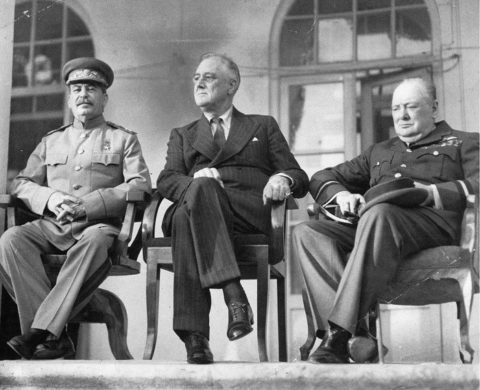
The “Big Three” meet at Tehran, 28 November-1 December, 1943.
Photo attributed to US Army photographer, via Wikimedia Commons.
Churchill’s support for Stalin during the Second World War followed from a simple calculus of the lesser of two evils. Britain could only take on one evil empire at a time, and, of the two, Churchill believed that Nazi Germany posed the greater threat to liberty. He famously remarked, “If Hitler invaded Hell I would make at least a favourable reference to the Devil in the House of Commons.” McMeekin attempts to sidestep this harsh reality, writing: “Whether or not the payoff was worth the price is a question well worth debating.” Churchill’s alliance with the Soviets stands or falls on this question: was Nazi Germany or the Soviet Union the greater danger in 1939?
With hindsight, one can easily marshal facts that portray Soviet communism as the greater evil. According to the best available estimates, the Stalin regime killed 20 millions of its own citizens. Nearly six million of those deaths occurred during the 1932–33 famine brought about by Stalin’s collectivization policies. While Nazi Germany also killed 17 million civilians, most of those deaths occurred after Hitler’s invasion of the Soviet Union in 1941. Thus, on the eve of the Second World War, one could argue — as Chamberlain and the appeasers did — that Nazi Germany served as a useful bulwark against a greater danger: the Soviet Union.
This analysis, however, misses a crucial point — one that Churchill recognized. Until 1939, the horrors of the Soviet regime had been primarily restricted to its own borders, while Nazi Germany had already made its expansionist ambition clear. In 1938, Germany annexed Austria. Later that year, Germany seized the Sudetenland. In 1939, the rest of Czechoslovakia passed under Hitler’s control. The Nazi doctrine of Lebensraum dictated even greater expansion. By contrast, Stalin’s doctrine of “socialism in one country” had kept the Soviet Union relatively peaceful until the Second World War began.
July 25, 2021
Wehrmacht Conquers 250 Miles of Nothing – WW2 – 152a – July 24, 1942
World War Two
Published 24 Jul 2021The Soviets keep withdrawing from the advancing Axis forces, and Hitler keeps issuing contrary orders to try and stop that, with the results that logistics are getting screwed up and the mobile units are bogged down in huge traffic jams. The Allies have decided not to open a second front in Europe in 1942, but do choose another spot to begin the long counter offensive.
(more…)
June 23, 2021
QotD: Churchill’s support for Stalin
Churchill threw all of his support behind Stalin’s armies despite Stalin’s alliance with Hitler during the first 21 months of the war — the USSR having invaded the same number of countries as Nazi Germany (seven), having supplied the German Wehrmacht as it invaded France and the Low Countries, and having literally fueled the Luftwaffe as it bombed London in 1940.
This support was more than rhetorical. In a gesture of astonishing (and short-sighted) selflessness, Churchill responded to news of Nazi Germany’s invasion of the Soviet Union by sending Stalin 200 brand-new Hawker Hurricane pursuit planes which had been pledged to defend Singapore against Japanese attack. Churchill then “re-gifted” Stalin 200 Tomahawk fighters and 300 Douglas A-20 Havoc bombers from Britain’s own Lend-Lease consignments, and shipped Stalin 2,000 tonnes of processed aluminum for Soviet warplane factories, despite it being desperately needed at home.
Even more striking was Churchill’s decision to ship Stalin nearly 600 tanks, which helped tip the balance in the Battle of Moscow in December 1941. Churchill even agreed to strip Cairo command of hundreds more tanks in 1942, routing them to Stalin’s USSR via Iran to bail out the Red Army at Stalingrad, which left Egypt vulnerable to Rommel’s Afrika Korps.
Churchill doubled down on his pro-Soviet policies even in areas where Britain had her own clients, such as Yugoslavia. Despite hosting the Yugoslav exile government in London, by September 1943, Churchill abandoned that government’s commander on the ground and threw his full support behind Stalin’s man, Josip Broz (“Tito”). Bamboozled by a Soviet smear campaign against Colonel Draža Mihailovic, Churchill cut off Mihailovic’s Chetniks and shipped Tito more than 100 times more war materiel over the next nine months than Mihailovic had received in the previous two years.
Sean McMeekin, “Churchill’s enigma: the real riddle is why he cozied up to Stalin”, Spectator, 2021-03-21.
June 12, 2021
Normandy – 1944 | Movietone Moment | 11 June 2021
British Movietone
Published 11 Jun 2021On this day in 1944, five days after the D-Day landing, the allied forces converged in Normandy. Here is a British Movietone report covering the event.
More and more reinforcements and supplies arrive in Normandy each day. In the skies Allied air power continues to bomb and strafe the enemy. Captured German film shows Rommel and von Rundstedt visiting the vast concrete fortifications on the coast which were thought to be impassable. Mr Churchill arrived onboard HMS Kelvin and was greeted by General Montgomery as he came ashore.
Cut story – Dusk or dawn shot of destroyer with sun rising or sinking in background. Sunrise with armada in fore. Yanks board LCIs. Shots of LCTs. Beached equipment unloaded. GV of activity on beach. British troops of LTC. CU Tedder on bridge of ship. GS of Ramsay & Vian. Tedder, Ramsay & Vian walk along raft into camera. Elevated shot of activity on beach, very good. Troops build airstrip, bulldozers etc. at work. Plane takes off. Camera gun – shooting up trains, transport, & other targets, several large explosions. British pass through street, Frenchmen look on. AFU – British soldiers at look-out with field glasses. Troops (Canadian or British) run through fields & wooded country. Troops through street, French clap. Army transport passes through street, directed by soldier. Yanks march through streets. POW along roads, & over beach, wade out to LCT, one attempts to pull up sock while walking. Captured German reel GS of Rommel & Rundstedt. CU Rommel. SCU of coastal guns, & various shots of fortifications, pillboxes etc. Rommel & Rundstedt walk round inspecting same, look at double barrel coastal gun. SCU of barrel of guns, & various shots of Atlantic Wall (AFU British troops knock part of “Wall” down which they have captured). Eisenhower, Marshall & Arnold on bridge of ship. GV of destroyer Kelvin at sea – very good. CU Churchill in Trinity House uniform, wearing glasses. Churchill assists Brooke with “Mae West” life jackets. Both seated on deck Kelvin at sea. CU Churchill. Kelvin passes Nelson, Ramillies & other warships also large part of armada. Churchill transfers … ships, sailors cheer as he leaves. CU Churchill. CU Smuts both very good. Churchill, Smuts & Brooke in “Duck” [DUKW]. Churchill leans over side talks to Montgomery, Churchill alights from “Duck”. Shakes hands with Monty. The above four in group on beach, walk through crowds of soldiers. AFU – Monty stands on raised platform addresses troops (silent) Monty & Churchill through crowds. Churchill with Monty & climbs into Jeep. SEE STORY NUMBER 44914/2 & 44914/3 FOR CUTS
AP Has HD copy – HD ProRes 422 4:3 – 24fpsDisclaimer: British Movietone is an historical collection. Any views and expressions within either the video or metadata of the collection are reproduced for historical accuracy and do not represent the opinions or editorial policies of the Associated Press.
You can license this footage for commercial use through AP Archive – the story number bm44914
#Normandy #WWII #DDay
Find out more about AP Archive: http://www.aparchive.com/HowWeWork
Twitter: https://twitter.com/AP_Archive
Tumblr: https://aparchives.tumblr.com/
Instagram: https://www.instagram.com/APNews/

